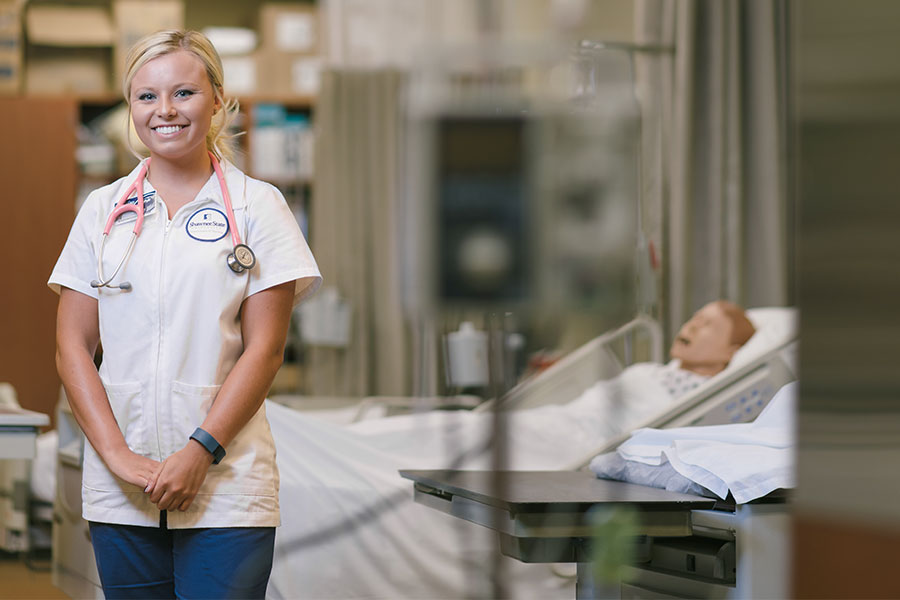
Mission Statement
The School of Nursing is committed to the delivery of high quality education, provision of service to the community, and promotion of the profession of nursing.
History of Nursing at Shawnee State University
Shawnee State University’s Associate Degree Nursing Program began in 1969 at the Ohio University-Portsmouth Campus under the direction of Ms. Gladys Scott. In 1975, a merger of the Ohio University-Portsmouth Campus and the Scioto Technical College occurred which resulted in the creation of Shawnee State General and Technical College. Two years later, Shawnee State General and Technical College became Shawnee State Community College. An act of the legislature created what is currently Shawnee State University in 1986.
In 1971, the first of many Associate Degree Nursing graduates took their place in community hospitals as nurses capable of functioning in a system traditionally staffed with diploma nurse graduates. As the Associate Degree Nursing Program continued to produce competent practitioners, previous skepticism was replaced with respect for the associate degree nurse. Although the basic ADN program prepares nurses to function as technical nurses caring for clients, Shawnee’s graduates have assumed multiple roles in many health care facilities across the nation. Additionally, many graduates have continued their education, pursuing higher degrees in nursing.
Since 1979, the SSU Associate Degree Nursing Program has had full Ohio Board of Nursing approval. In 1994, Shawnee State University celebrated the twenty-fifth anniversary of the Associate Degree Nursing Program. Over the years, the ADN Program has become well known throughout the tri-state area for the quality of its graduates. In recognition of this quality, the National League of Nursing Accrediting Commission granted NLNAC Accreditation to the Associate Degree Nursing Program in the fall of 2001. The program continues to maintain accreditation through the Accreditation Commission for Education in Nursing.
In fall 1998, the RN-BSN Program of Shawnee State University admitted its first class of students. The first graduating class was in spring 1999. Each subsequent year, the number of students admitted and progressing through the curriculum has grown. In fall 2001, the National League of Nursing Accrediting Commission granted NLNAC Accreditation for the RN-BSN Program, and the accreditation continues with the Accreditation Commission for Education in Nursing. Responding to increasing temporal demands of the practicing nurse in the 21stcentury, the faculty has maintained flexibility in coursework, including online programming, to permit RNs to stay in the workforce while pursuing a professional degree.
A needs assessment conducted in during 2009 revealed area demands for more baccalaureate prepared nurses. In an attempt to meet this local need as well as confront the changes in science, technology, and nature and settings of nursing practice, Shawnee State University admitted its first class of BSN students in the fall 2012.
We would like to welcome you to Shawnee State University’s School of Nursing. The chairperson and faculty are dedicated to maintaining the integrity and quality of our nursing programs. You have an opportunity to become part of the proud history and tradition of our University, our nursing programs, and the nursing profession.
Philosophy
Shawnee State University’s School of Nursing believes the client is influenced by cultural, biological, psychological, social, spiritual, and environmental dynamics that create the human experience. The client is an individual, family, group, community, or population and an integrated whole that is unique, adapts and grows, deserves respect, and has the right to make both independent and collaborative choices regarding healthcare.
The environment is the cultural, spiritual, social, economic, political, and physical surroundings affecting the client’s safety and quality of the client’s health. In turn, the client affects the environment and can alter the environment to enhance or diminish his/her ability to achieve a desired level of well-being.
Health is a state of wholeness which exists on a continuum across the life span. It is the result of cultural, biological, psychological, social, spiritual, and environmental dynamics interacting on different levels with varying emphases at different times. Health demands are met by assisting clients to achieve optimal outcomes.
Nursing is a profession that creatively uses knowledge from the sciences and humanities to plan, provide, and evaluate interventions grounded in evidence to compassionately meet the unique healthcare needs of the client. Nursing is an evolving science that integrates concepts, ideas, and theories through critical inquiry to develop an understanding of client responses to interventions. Nurses identify clinical problems and participate in the generation of new knowledge. Nurses assume leadership roles to identify and implement changes affecting the human experience.
Learning is a continuous process involving cognitive, affective, and psychomotor skills. Self-discovery and personal growth in the learning process are enhanced and encouraged in an environment of professional collaboration. The educational experience develops communication processes, clinical reasoning and judgment, analytical inquiry, creativity, and ethical comportment preparing the graduate for the complexities and challenges in nursing practice.
Nursing faculty are facilitators and mentors for learning. Nursing faculty encourage an appreciation and desire in each student for new knowledge and life-long learning. Graduate nurses are an integral part in the continuing development of the profession.
